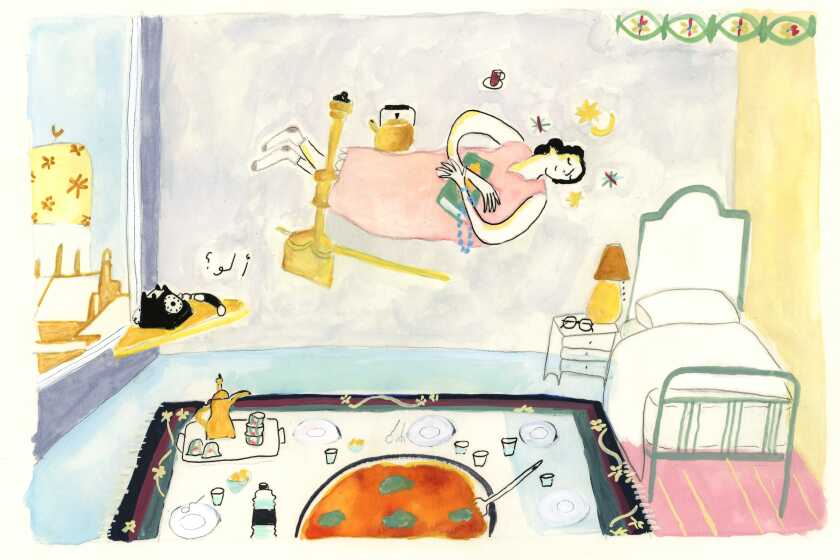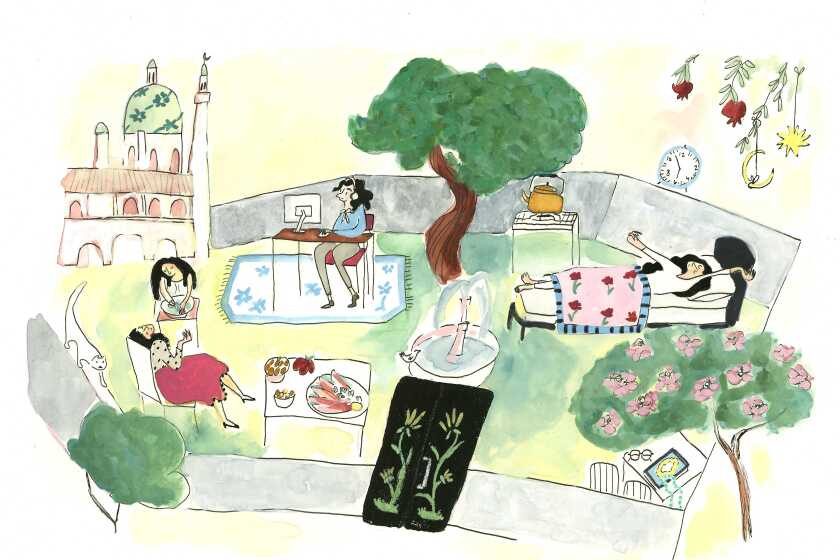Working around food while fasting for Ramadan? For some, it’s not so bad
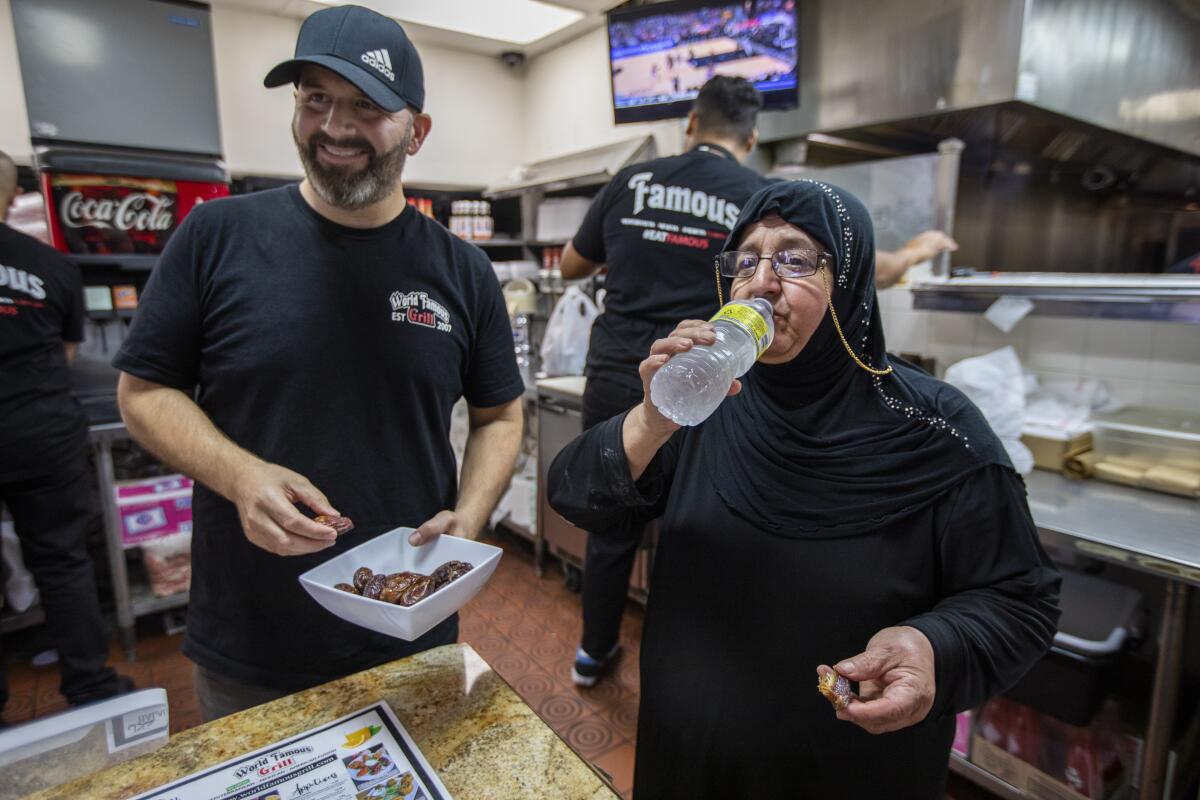
- Share via
The scent of shawarma and rice floated through the Mediterranean fusion restaurant during the lunchtime rush as servers brought heaping plates of meat, hummus and pickled vegetables to hungry diners.
Ali Tehfi watched as his crew — many of them, like him, fasting for Ramadan — bagged orders, filled soda cups and alternated between cooking up burgers, quesadillas and kebabs. They worked amid the cacophony of clanging utensils, unfazed by the constant presence of food despite their empty stomachs.
“There’s times where literally all the food is in front of me, and we’re making things or have orders, and it doesn’t bother me,” said Tehfi, who opened World Famous Grill in Bell 15 years ago. “The whole purpose of fasting is to fast from everything — not just food — but from everything that’s bad.”
During Ramadan, the ninth month of the Islamic calendar, Muslims fast from shortly before dawn until dusk as part of a broader call to refrain from sinning and to bolster their patience, enhance their understanding of sacrifice and strengthen their relationship with God.
For non-Muslims, the idea of fasting for a month while working around food might seem torturous. Yet nearly two weeks into his fast, the only thing Tehfi truly missed was the coffee he typically sips throughout the day. His cousin thought about the cigarette she could be smoking. And the young woman working the register was hungry but not particularly tempted by the chicken sizzling in the kitchen.
“Sometimes people come to break the fast, and they’re impatient,” Tehfi, 42, said. “And I say, ‘Brother, you fasted for how many hours all day? You can’t wait an extra five minutes? You haven’t gained that patience from your fast?’”
Faith, fasting, food, entertainment and more. Here’s The Times’ full coverage of Ramadan this year.
Tehfi often tells his five sons — ages 5 to 18 — that they need to understand why they are fasting and praying during Ramadan. His older sons play soccer while fasting, he said, and a younger one decided to try to fast with the rest of his family, even though young children aren’t required to participate.
“For me, it’s a form of meditation,” said Tehfi, who began fasting when he was 8. “When you cannot drink water when you’re so thirsty, and not eat when you’re so hungry, then you can face other stuff.”
But fasting, one of the five pillars of Islam, a practice required of those who are healthy enough to do so during Ramadan, isn’t easy for everyone. It can be tiring to navigate nighttime prayers, wake up in time for a predawn breakfast and then endure a full day’s work. Few places would seem like a tougher proving ground for keeping the faith than working in a restaurant.
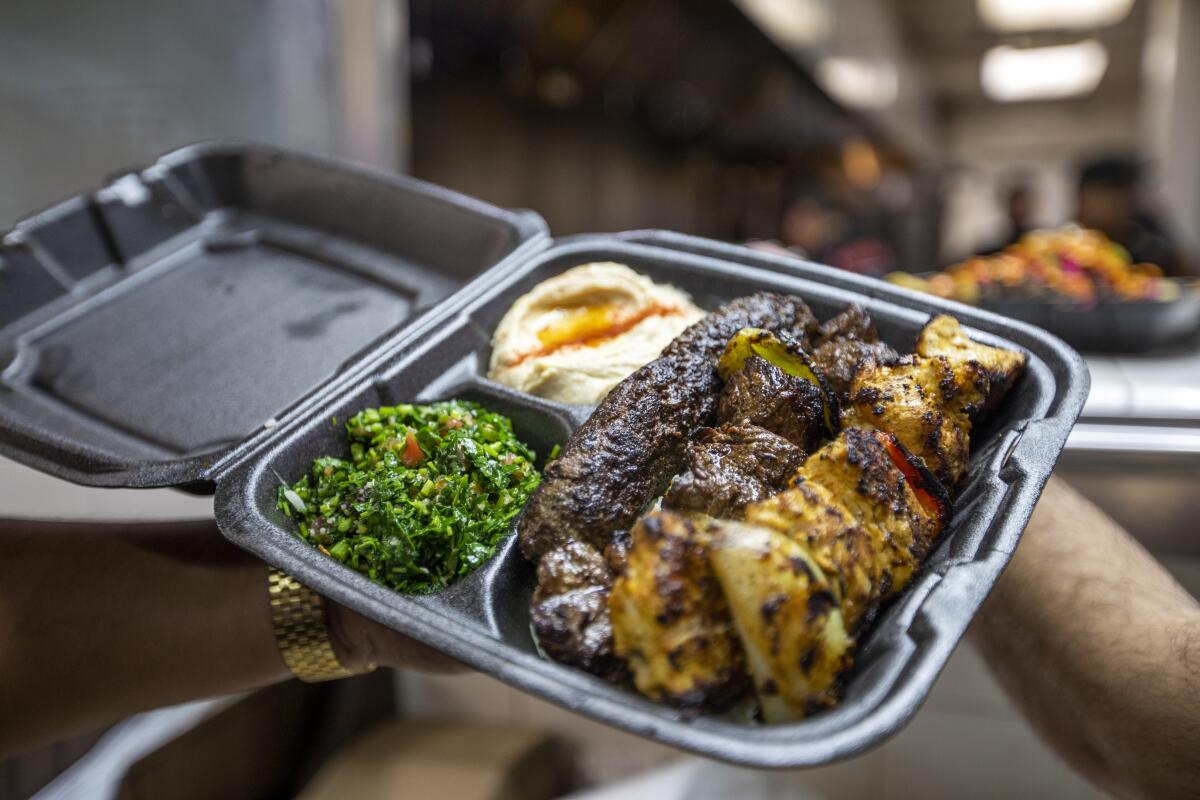
Behind the doors of the grill’s kitchen in the early afternoon, Leila Chahine stood over a metal table near the oven and pulverized chickpeas in a food processor, mixing them with olive oil and and ladles of tahini to make a creamy hummus. To her, fasting is a means of testing herself — a challenge she doesn’t always love but one she values.
“I get full from the smell,” she joked. “But I get hungry when I get home, because I realize I haven’t eaten all day.”
Scraping the dip into a large dish, Chahine said that not reaching for a cigarette or coffee is harder than avoiding lunch. Still, she welcomes the introspection that comes from abstaining.
“It helps my body,” she said. “When I smoke one at the end of the day, it’s like, what if I couldn’t buy this or it didn’t exist anymore?”
Fasting is an inherently silent endeavor and, at times, Tehfi and others at the restaurant have to explain to customers fishing for food recommendations that they haven’t eaten since before dawn. But Bell is home to a growing Lebanese American community, Tehfi said, and there is generally little need to explain what Ramadan is to the regulars.
Before the COVID-19 pandemic, World Famous Grill was a popular place for young people in the community to gather during Ramadan, Tehfi said. The restaurant would stay open until the predawn hours, when diners of all ages would come for a large-scale suhoor, the morning meal eaten before sunrise.
The booths inside were packed, he said, and the parking lot was filled with people sitting on top of their cars with their mouths full, like they had joined a Ramadan tailgate. Sometimes people would wander in, curious about the 2 a.m. parties they’d stumbled upon. The scene was particularly special to Tehfi, a Bell native who grew up eating parfaits and mashed potatoes at the KFC that once sat in the same spot his restaurant does today.
“People were so alive,” he said, recalling the gatherings.
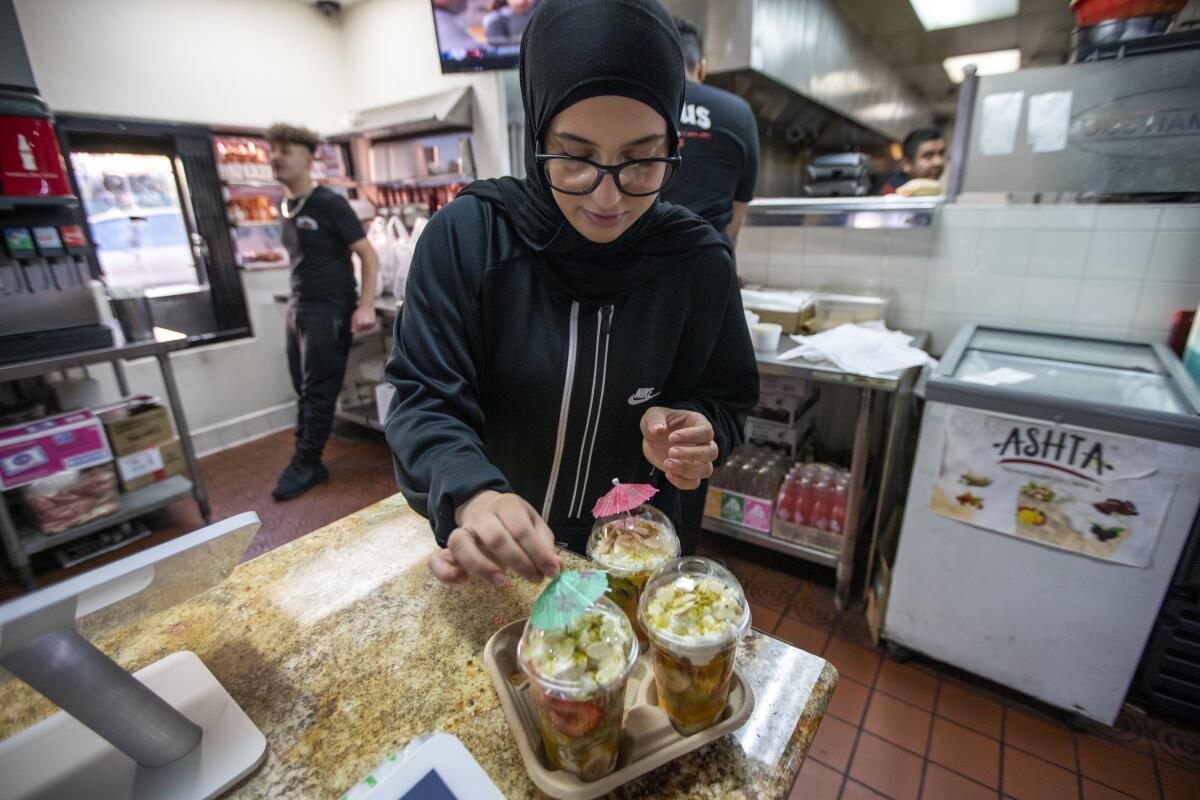
On a recent Saturday afternoon, Tehfi’s mother, Zeinab, deftly plucked her fingers through delicate dough, filling her baklava rolls with generous portions of ashta, a Lebanese clotted cream. The 70-year-old comes in early to bake sweets and savory flatbreads, unbothered by the aroma of warm sugar and pistachio or the smell of freshly baked pizza-like lahmajoun.
Hunched over the treats, she said she enjoys fasting. She also fasts for the two months before Ramadan every year.
“For me, it’s not hard,” she said of preparing food all day. “People eating, I don’t care.”
Families trickled into the restaurant to pick up sweets for their iftar feasts. Some took home baklava; others ordered fruit cups topped with ashta.
Rana Khanafer placed pink and blue mini umbrellas into fruit cups and explained that she has been fasting at Ramadan since she was 9. Sometimes, she said, customers ask her what the benefits are to fasting, or how she feels. Some comment that she must be thirsty. The 19-year-old doesn’t mind — she sees it as a teaching moment.
“I’m so used to it,” she said.
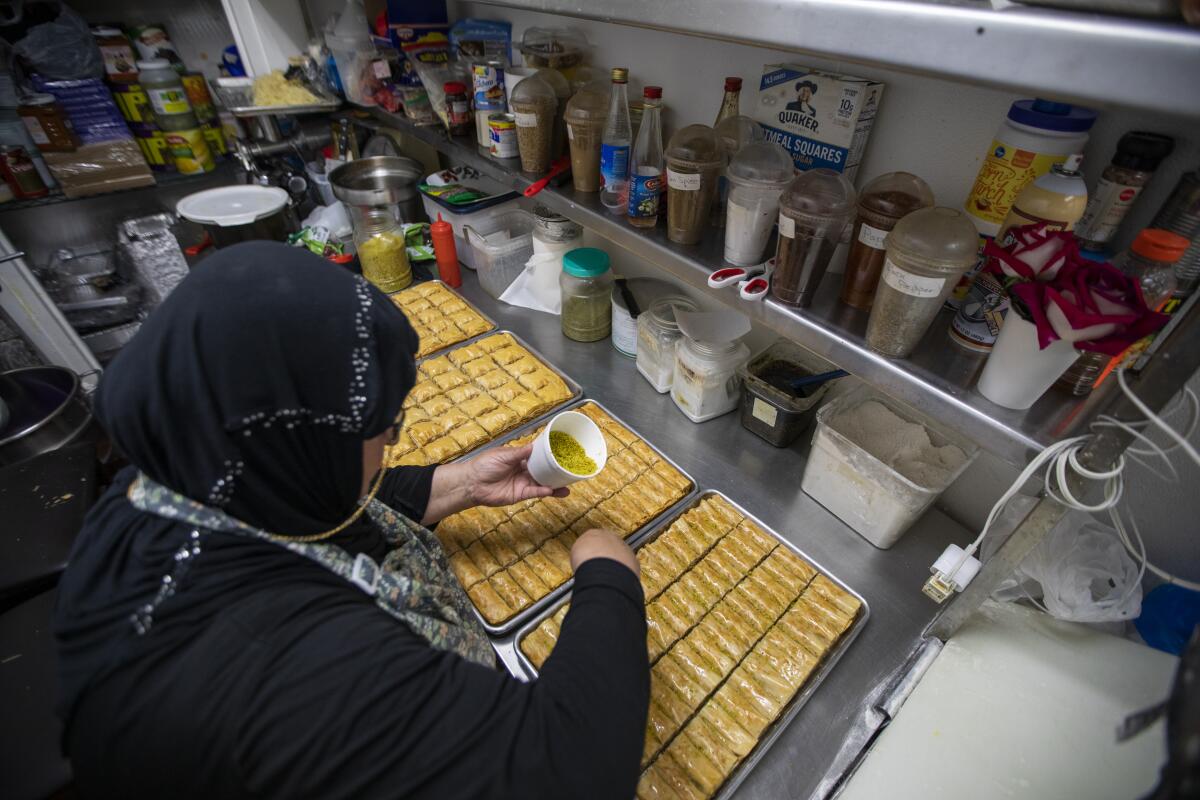
Around 7 p.m., several groups of friends and families filled tables, eager to break their fast. Dusk would hit just a few minutes later, and a couple of customers ordered their food ahead of time, then tucked into the market attached to the restaurant to pray; the shop had closed earlier in the day, giving those who wanted to use the space the opportunity for some privacy.
Hadya Sheikh and Mehak Khan came from Downey to eat their iftar meal together. The college students said they have been eating at the restaurant since they were kids and decided to spend their Saturday night there because it gave them a sense of nostalgia and comfort. They both ordered chicken: Sheikh, a wrap; Khan, a burger.
Taking her first sip of water since the early morning, Sheikh said fasting served as a reminder to try to find her inner peace. The young women joked that it can be difficult to balance fasting with a social life with friends who aren’t Muslim, who often invite them out to eat.
“I say to them, ‘This entire month, I can’t go with you to lunch,’” said Khan, 23, laughing.
One table over, Yakub and Minu Patel sat with about 10 other family members and ordered steak, quesadillas and burgers, among other entrees. Their son Faisal lives in West Hills and brought the family to the restaurant because it’s “our favorite spot,” he said.
Faisal Patel, 46, said his family makes the long drive several times during Ramadan. His parents like to come when they visit from India.
Health advice for Islam’s holy month can also benefit anyone who is doing intermittent fasting or wants to eat healthier.
To him, fasting is “a reset.” The practice slows everything down and helps him take stock of what’s happening in his life. When he explains it to co-workers, he likens the Ramadan fast to the intermittent fasting popular among many in the fitness world. Still, he said, he doesn’t understand how someone could fast while working with food all day.
“I can’t even wait at a table with food on it,” he said. “Respect to them.”
Tehfi, his mother and co-workers didn’t break their fast until food was on each customer’s table.
Just after 7:30 p.m., he gathered everyone together by the cash register and unwrapped a bowl of dates. His mom cracked open a bottle of water, remarking that she wasn’t hungry or thirsty. Khanafer quickly ate a date that was “so good.”
Then Tehfi reached in, grabbed a piece of the unassuming fruit and took a bite, with a smile and a thumbs-up.
Times staff writer Rubaina Azhar contributed to this report.
Getting through a month of fasting is hard, but there are things you can do to make it easier, and more meaningful, for yourself or your Muslim friends.
More to Read
Sign up for Essential California
The most important California stories and recommendations in your inbox every morning.
You may occasionally receive promotional content from the Los Angeles Times.
